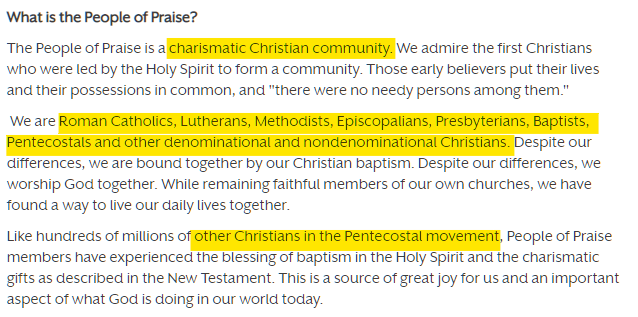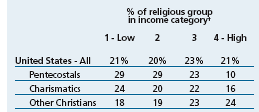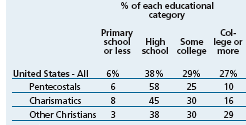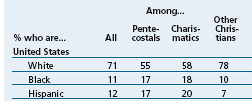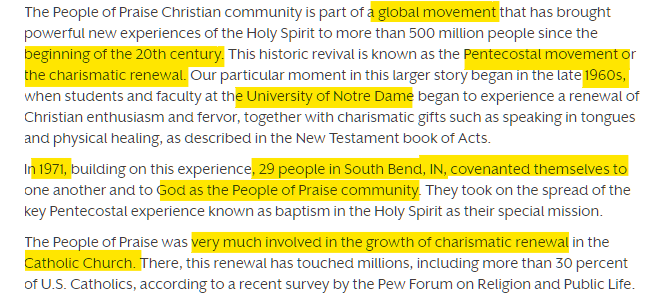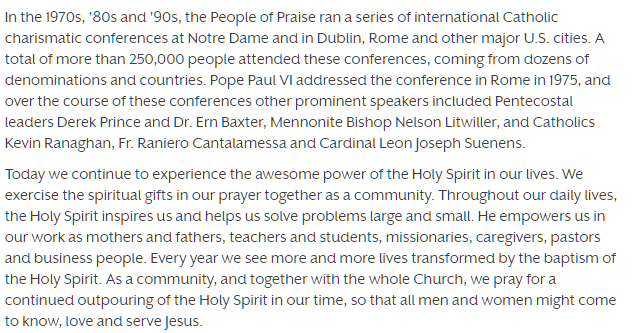Well, I& #39;m at the point where I actually have to research the People of Praise, which I& #39;ve seen described as a secretive Catholic group.
So I started with the FAQ on their website. https://twitter.com/smbrnsn/status/1309650586342699009">https://twitter.com/smbrnsn/s...
So I started with the FAQ on their website. https://twitter.com/smbrnsn/status/1309650586342699009">https://twitter.com/smbrnsn/s...
I& #39;ll add to this thread occasionally throughout the day, but let me first tell you that there are people who understand what the charismatic movement is and what that implies with some detail, and people who do not, and if you are in the latter group you need to recognize that.
Oh, yeah what "charismatic movement" implies is not actually going to make anyone concerned feel better about Barrett. It& #39;s just good to be grounded in knowledge. https://twitter.com/LagodaBrian/status/1309878671952556035?s=20">https://twitter.com/LagodaBri...
I am not an actual expert in Pentecostalism, but I am religiously literate and would explain it this way:
The (X-ian) Bible refers several times to gifts or charism, which are extraordinary supernatural gifts given to some Christians by the Holy Spirit https://twitter.com/csilverandgold/status/1309879533743616002?s=20">https://twitter.com/csilveran...
The (X-ian) Bible refers several times to gifts or charism, which are extraordinary supernatural gifts given to some Christians by the Holy Spirit https://twitter.com/csilverandgold/status/1309879533743616002?s=20">https://twitter.com/csilveran...
Some of this is the gift of being a particularly talented speaker, particularly good judgement or a particularly charitable person. Some of this is speaking in tongues and prophecy.
So Christians have a few options of how to interpret this:
So Christians have a few options of how to interpret this:
1. supernatural-supernatural charisms don& #39;t exist and never have, it was a metaphor or something
2. charism once existed but now no longer do
3. charism still exist, but are rare
4. charism are happening all the time right now!!!
Pentecostals took door number 4.
2. charism once existed but now no longer do
3. charism still exist, but are rare
4. charism are happening all the time right now!!!
Pentecostals took door number 4.
I& #39;m probably glossing over history a bit too much, but I would contextualize Pentecostals within The Great Awakening, that delightfully American phenomenon where the people, well, set out to Make Religion Great Again and restore the wild crazy religious stuff that was lost.
Sorry, I am referring to the *third* such Great Awakening
There& #39;s a way of thinking about Pentecostalism as evangelicalism with the heat turned up. I think that& #39;s too simplistic a model. It& #39;s a style and feeling and particular theological commitments that can fit in and among other Christian ideas without being cleaved to one per se.
Pentecostalism is both a movement that defines a denomination (Pentecostalists, naturally) and a meta-denominational idea that the wild supernatural stuff is back again and you might have it yourself - or at least get to be adjacent to it.
Which seems weird to a lot of people, but Christians also generally believe that God became flesh, died our sins, and was resurrected.
All religion is weird!
All religion is weird!
More after lunch.
OK I& #39;ve told you that charismatics/Pentecostals are a bunch of weirdos with retrograde ideas about supernaturalism and you are unsettled by that and would like to know more about the people you dislike.
@PewReligion has you covered. https://www.pewforum.org/2006/10/05/spirit-and-power-a-10-country-survey-of-pentecostals5/">https://www.pewforum.org/2006/10/0...
@PewReligion has you covered. https://www.pewforum.org/2006/10/05/spirit-and-power-a-10-country-survey-of-pentecostals5/">https://www.pewforum.org/2006/10/0...
"Renewalist" in this context is either a member of a Pentecostal denomination AND/OR someone who expresses belief in charism/speaks in tongues regularly.
As alluded to earlier, belief in charism has spread throughout the mainline Protestant and Catholic Churches.
More later.
As alluded to earlier, belief in charism has spread throughout the mainline Protestant and Catholic Churches.
More later.
First, let& #39;s dig into the demographics a little. I& #39;m focusing just on the US, from the same report linked above and what we find is that renewalists are less wealthy, less educated, and less white.
(This is not a surprise to Black people, see. e.g.,) https://twitter.com/csilverandgold/status/1309880079514824706?s=20">https://twitter.com/csilveran...
And, here I am speaking with my amateur sociologist of religion hat on, it& #39;s not surprising that people with less power are attracted to religious beliefs that promise them tangible divine favor.
Of course, with that same hat on, it& #39;s entirely unsurprising that such people and beliefs are disdained by the people who already have power through race, money, or education.
Mostly, I just want to provide context for how weird Barrett is or is not.
Mostly, I just want to provide context for how weird Barrett is or is not.
Which isn& #39;t to say she isn& #39;t weird. The fact that she is a charismatic Catholic is unusual, and is going to look very weird to other Catholics, including and especially traditionalist ones!
NB: @MikeBlack114 is a Twitter friend, this is not a dunk. https://twitter.com/MikeBlack114/status/1308576836377550854?s=20">https://twitter.com/MikeBlack...
NB: @MikeBlack114 is a Twitter friend, this is not a dunk. https://twitter.com/MikeBlack114/status/1308576836377550854?s=20">https://twitter.com/MikeBlack...
If you& #39;re familiar with evangelical Christianity, belief in charism is just not that weird, not among the branch of Christianity that prizes religious experience, "literalist" readings of the Bible and has a rich religious language concerning being "born again".
But, and this is important. ***Christians are actually not very familiar with other Christians***
Like everyone else, what they see among themselves and on TV is what they assume is normal and ubiquitous.
Like everyone else, what they see among themselves and on TV is what they assume is normal and ubiquitous.
In fact what is on TV is some sort of odd metadenominational Christian pastiche. Unless you have made specific efforts to counteract it, what you know about Christians, including and especially about what they believe about other Christians, is wrong. https://twitter.com/apophatically/status/1309624553379950597?s=20">https://twitter.com/apophatic...
So with respect to @mikeblack114 and his family here, just because they are weirded out doesn& #39;t mean that People of Praise are a cult. It only proves that they& #39;re weirded out. https://twitter.com/MikeBlack114/status/1308576836377550854?s=20">https://twitter.com/MikeBlack...
Anyway. I haven& #39;t actually researched People of Praise beyond that snapshot of the FAQ yet, and that& #39;s part of my point. There& #39;s a lot of background knowledge that goes into being religiously literate enough to know whether you should be freaked out or not about them.
I& #39;m going to do a little primary source reading and live-tweet as I go. I will make mistakes, but that& #39;s part of the learning process. First let me lay out some preliminary findings that I& #39;ll be seeking to validate or discard:
1. Amy Coney Barrett is not a tradcath at all, but a charismatic. It& #39;s very possible to construct belief system that accommodates both as apparently Alexi has (would love your thoughts on this if you want to share) but it is atypical. https://twitter.com/AlexiSargeant/status/1309894447577038849?s=20">https://twitter.com/AlexiSarg...
2. Regardless of whether People of Praise is mostly Catholic by population or not, their language should be read the way I read evangelical church speak.
3. People of Praise is likely to be an organization around organizing a thick sense of Christian community, but not a separatist one. Compare as necessary with Rod Dreher.
OK. Let& #39;s begin. I usually start with the Statement of Faith, which usually paints you 90% of the picture. It does not in this case because there isn& #39;t one. Instead there is a who we are page. I suspect I& #39;ll find out why on the Ecumenical tab.
https://peopleofpraise.org/about/who-we-are/">https://peopleofpraise.org/about/who...
https://peopleofpraise.org/about/who-we-are/">https://peopleofpraise.org/about/who...
So, straight up they tell you that they& #39;re charismatics. It& #39;s going to be the weirdest thing about them by far and they are not ashamed of it (nor should they be). What& #39;s even more interesting is they imply a certain amount of communitarian living that uh, I doubt.
I think it& #39;s more likely a sly reference to a tithing and charitable giving expectation. But hey, if Barrett is giving up a big chunk of her law prof and then judge salary to this, I& #39;m all for it.
As an amateur religious scholar, I find Christianity& #39;s incessant schisming its most fascinating quality and an inevitable one. As a Christian myself, I find it scandalous and shameful.
It& #39;s interesting that they rely on baptism as the common ground, considering the RCC just declared a number of its own baptisms because of the wording of the baptism itself.
Speaking of all Christianity is weird including to other Christians, WTF guys. https://twitter.com/JamesMartinSJ/status/1298735293793742853">https://twitter.com/JamesMart...
Speaking of all Christianity is weird including to other Christians, WTF guys. https://twitter.com/JamesMartinSJ/status/1298735293793742853">https://twitter.com/JamesMart...
Anyway, why not just form their own denomination Maybe they can& #39;t bridge theological schisms, or the Catholics fully buy into the reality of the Catholic priesthood. So they hang out a lot.
Sounds a bit too much like Cru for my personal tastes, but it& #39;s very legible.
Sounds a bit too much like Cru for my personal tastes, but it& #39;s very legible.
My snap reaction here is that this is a monastic community minus cloistering and obedience to the Pope, plus evangelical church speak.
"covenant" is church speak for agreement. (It& #39;s also lawyer-speak for a contract)
"covenant" is church speak for agreement. (It& #39;s also lawyer-speak for a contract)
Side note, I was once inside a Protestant church of some sort or another for... a wedding I think? and I annoyed my wife by flipping through their reading material which included a thick member handbook requiring frequent attendance to group meetings and a phased onboarding.
Again, not my personal preference, but quite legible. Also, way better than your typical megachurch.
Hrm, I take back a little what I said about not being ashamed. This is defensive writing. We& #39;re not that weird, there are millions of us. Millions!
Religious groups are many things, among them is a series of nested and interminable committee meetings from which even God cannot free you until everyone has touches on every communication.
Wow what a paragraph.
So in the yellow highlight we can deduce that members were doing fine SES wise. In the magenta highlight, again, extremely now adults who were into Cru energy, and in the cyan a red flag! Someone get urbanist Twitter on this. Good gentrification or bad?
So in the yellow highlight we can deduce that members were doing fine SES wise. In the magenta highlight, again, extremely now adults who were into Cru energy, and in the cyan a red flag! Someone get urbanist Twitter on this. Good gentrification or bad?
Secretive!
(I have no doubt there are aspects that are private or even secret, but this is not how a secretive organization acts)
(I have no doubt there are aspects that are private or even secret, but this is not how a secretive organization acts)
I think I have time and focus for one more tab, let& #39;s learn about what "charismatic" means to these people.
Which is a good reminder. I know what charismatic means in the general sense, I still want to know what they think specifically.
https://peopleofpraise.org/about/who-we-are/charismatic1/">https://peopleofpraise.org/about/who...
Which is a good reminder. I know what charismatic means in the general sense, I still want to know what they think specifically.
https://peopleofpraise.org/about/who-we-are/charismatic1/">https://peopleofpraise.org/about/who...
Always, always, always, always remember that you have to start with what people are actually saying, which requires you to validate your assumptions on what *they* mean to communicate with their word choices, and *not* with your reactions.
Lots of good information here. They& #39;re contextualizing themselves as part of the Pentecostal movement by name, were there at the start of the spread out of the Pentecostal denominations and into wider Christian, and they& #39;re taking credit for it.
Again, not secretive.
Again, not secretive.
The last two grafs are mostly boring, but they do help shift my priors towards understanding People of Praise within a Catholic context, particularly that of the late 1960s, early 1970s as opposed to today& #39;s culture wars although those still might matter.
Alright, Amy Coney Barrett has been officially nominated for the Supreme Court seat vacated by the late Justice Ruth Bader Ginsburg. It& #39;s a significant moment that has all the makings of a constitutional crisis.
I will instead be talking about the People of Praise.
I will instead be talking about the People of Praise.
We are on the second subtab of "who we are", "Ecumenical", which has two definitions:
1. cooperation between the many Christian denominations
2. meetings held by the RCC that it claims are authoritative over all Christians.
https://peopleofpraise.org/about/who-we-are/ecumenical/
Not">https://peopleofpraise.org/about/who... that I& #39;m bitter.
1. cooperation between the many Christian denominations
2. meetings held by the RCC that it claims are authoritative over all Christians.
https://peopleofpraise.org/about/who-we-are/ecumenical/
Not">https://peopleofpraise.org/about/who... that I& #39;m bitter.
We get some vague statements about how diverse the community is but no sense of proportions.
Also, a picture of a wedding which is odd since they pretty strongly implied that the weddings would be conducted within the home churches of members. Lovely photo though.
Also, a picture of a wedding which is odd since they pretty strongly implied that the weddings would be conducted within the home churches of members. Lovely photo though.
This feel very much like a committee trying to come up with fun facts, and the emphasis was not on "fun".
This is is more interesting, because it demonstrates two things. First, that they are trying to position themselves not as a Catholic organization, but part of a multi-denominational movement even as they cite Catholic roots and links to a Catholic community, see above tweet.
Second, this history strongly implies the actual ecumenical outreach part is done. They& #39;re not emphasizing that they& #39;re still organizing these conferences after all. The story is more that they were part of the Pentecostal moment in the 1970s and now this community continues on.
What do these three locations have in common?
No, seriously, what do they have in common? At a guess I think this is going to be explained by where members of the community happened to move for work than anything else, Eagan and Falls Church both being suburbs of metropolitans.
No, seriously, what do they have in common? At a guess I think this is going to be explained by where members of the community happened to move for work than anything else, Eagan and Falls Church both being suburbs of metropolitans.
Once again, the last paragraph is suddenly interesting!
1. Catholics and Protestants evangelizing together? Cats and dogs living together, total pandemonium! I seriously have questions about how that actually works out in practice.
1. Catholics and Protestants evangelizing together? Cats and dogs living together, total pandemonium! I seriously have questions about how that actually works out in practice.
2. The Mississippi Valley is their focus? Odd. Gives me the same weird vibes the cyan highlight did in the previous tweet. It could be good. It could be well-meaning affluent people causing trouble. Hard to tell. https://twitter.com/tznkai/status/1309917879018696705?s=20">https://twitter.com/tznkai/st...
2 cont& #39;d. I& #39;m also reminded of stories I& #39;ve heard from the Mormon (sorry, Church of Jesus Christ of Latter Day Saints) community about folks from Utah who call everything outside the Jello Belt the "mission field".
Ok, Iets plow through another, the "covenant" page. Reminder: "covenant" is church-speak for an agreement, maybe more specifically a solemn agreement. https://peopleofpraise.org/about/who-we-are/covenant/">https://peopleofpraise.org/about/who...
Alright then. In the yellow highlight we get the scariest sounding stuff, which I would contextualize the same way they did, by comparing them to cloistered communities.
In magenta we have what I like to call the D&D definition of "permanent" meaning "until reversed".
In magenta we have what I like to call the D&D definition of "permanent" meaning "until reversed".
My understanding of cloistered communities is that you can be released from your vows, but only by the appropriate authority, the Holy See for Catholics. As an ecumenical organization, the People of Praise have no higher authority but conscience and God.
Very Protestant.
Very Protestant.
It is now appropriate to talk about whether the People of Praise are usefully called a cult. I& #39;m going to skip past technical comparative definitions and go for a model instead. Like all models, it is wrong, but the intent is for it to be useful given the Discourse.
Here& #39;s my working definition of a cult:
1 An insular religious group
2. that holds particular sway over adherents
3. through sacred promise
4. and secular means.
1 An insular religious group
2. that holds particular sway over adherents
3. through sacred promise
4. and secular means.
That is to say a cult is a group that promises you salvation through an impressive leader who promises you heavenly rewards and also controls your daily behavior through fear, intimidation, and or owning your stuff.
Keep those factors in mind as we review the coming paragraphs.
In the yellow highlight we get a half-tithe. Significant to individual, but not super unusual for religious communities.
In magenta we have a committee, not a leader, but no clarity as to selection.
In the yellow highlight we get a half-tithe. Significant to individual, but not super unusual for religious communities.
In magenta we have a committee, not a leader, but no clarity as to selection.
This is actually a pitch, not a threat. People need community, and they hunger for thick supportive networks not in spite of American atomistic life, but because of it.
This raises a question for me: does this community practice shunning?
This raises a question for me: does this community practice shunning?
The yellow highlight is going to sound either lovely and aspirational or deeply sinister depending on how you& #39;re primed generally. I need to know more before I& #39;d be worried, e.g., that Barrett would decide a case some way because another member asked to be served in that way.
I highlighted the phrase "the Lord Jesus" because it& #39;s a potential tell of the denominational background of the writer, as opposed, e.g. "Lord Jesus", "our Lord Jesus", "Lord Jesus Christ", "Christ Jesus", etc. I& #39;ll have to do more research, but its the kind of thing to look for.
I could have phrased it a bit more elegantly, but degree matters a lot. Of the four factors I laid out, insularity is the one that most separates common religious experience from what I would call a cult in this context. https://twitter.com/melbataj/status/1310397061171482624?s=20">https://twitter.com/melbataj/...
And even having been briefly part of a sales team that had all sorts of uncomfortable rituals and near worship of money, they didn& #39;t claim to save my soul and they couldn& #39;t take away my car or stop me from seeing my family. Those factors matter a lot.
Based on what I know, even taking into account reports of members being accountable to a person who guides them on all major life decision, I doubt the People of Praise can be usefully called a cult, because I can& #39;t find the "or else" control mechanism.
The People of Praise are concurrently members of churches providing salvation and another community. The half-tithe is unlikely to be held in a way you can& #39;t stop giving it in the future and for all the talk of community life I think they all have their own homes.
Even if we layer on secret and sinister rituals the best leverage point they really have is the community. Of being liked and communicated with by your friends and family. Which does matter, a lot, but you scarcely need a cult to hurt someone with that bludgeon.
So if they practice shunning, which I have no evidence they do, that would push me towards the cult direction, but not all the way there. By the by, read up on shunning as practiced by e..g, the Amish, Jehovah& #39;s Witnesses, and the Roman Catholic Church before 1983.

 Read on Twitter
Read on Twitter